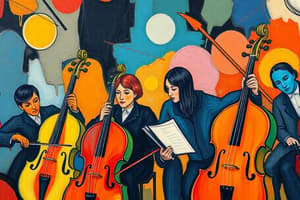Podcast
Questions and Answers
What are the two descriptions applicable to most Classical music?
What are the two descriptions applicable to most Classical music?
- Full of complexity and dissonance
- Full of 'natural' simplicity and pleasing variety (correct)
- Utilizes only vocal performances
- Focused on rhythm and percussion
What type of music received a boost from the rise of public concerts in the eighteenth century?
What type of music received a boost from the rise of public concerts in the eighteenth century?
Orchestral music
What was the most progressive style of opera in the latter part of the eighteenth century?
What was the most progressive style of opera in the latter part of the eighteenth century?
Opera buffa
Which types of tunes were sometimes included in Classical symphonies?
Which types of tunes were sometimes included in Classical symphonies?
What new institution supported the development of orchestral music in the eighteenth century?
What new institution supported the development of orchestral music in the eighteenth century?
Dynamics and gradual dynamic changes were specifically notated by composers in the Classical era.
Dynamics and gradual dynamic changes were specifically notated by composers in the Classical era.
Da capo form is one of the standard Classical forms.
Da capo form is one of the standard Classical forms.
The novel, a new literary genre of the eighteenth century can be compared to?
The novel, a new literary genre of the eighteenth century can be compared to?
Where did the Classical style develop principally?
Where did the Classical style develop principally?
A genre typical of the Rococo style is the?
A genre typical of the Rococo style is the?
Composers of Classical music worked extensively with all musical elements to add variety and flexibility.
Composers of Classical music worked extensively with all musical elements to add variety and flexibility.
The predominant texture of Classical music is?
The predominant texture of Classical music is?
The Classical use of dynamics was reflected in the popularity of the new instrument, the ________.
The Classical use of dynamics was reflected in the popularity of the new instrument, the ________.
Compared to Baroque composers, Classical composers employed a delicate and unobtrusive sort of polyphony in their music.
Compared to Baroque composers, Classical composers employed a delicate and unobtrusive sort of polyphony in their music.
What did the woodwind section of a Classical orchestra consist of?
What did the woodwind section of a Classical orchestra consist of?
What is a coda?
What is a coda?
In the Classical era, four-movement works such as ________ always included a minuet.
In the Classical era, four-movement works such as ________ always included a minuet.
What lists the form of a Classical minuet?
What lists the form of a Classical minuet?
The third movement in most Classical symphonies is generally in minuet form and triple meter.
The third movement in most Classical symphonies is generally in minuet form and triple meter.
The first movement in most Classical symphonies is generally a moderate or fast movement in rondo form.
The first movement in most Classical symphonies is generally a moderate or fast movement in rondo form.
What happens in a rondo?
What happens in a rondo?
What is a Classical minuet?
What is a Classical minuet?
When themes are broken up, recombined, reorchestrated, extended, or played in new musical contexts, they are being?
When themes are broken up, recombined, reorchestrated, extended, or played in new musical contexts, they are being?
While in Vienna, Mozart relied on ________ for income.
While in Vienna, Mozart relied on ________ for income.
In sonata form, which is true of the key in which the second theme is heard in the exposition?
In sonata form, which is true of the key in which the second theme is heard in the exposition?
A late-eighteenth-century work in sonata form that starts in the key of C major will end in the key of?
A late-eighteenth-century work in sonata form that starts in the key of C major will end in the key of?
What is the major genre developed by Classical composers?
What is the major genre developed by Classical composers?
In sonata form, in what key is the second theme likely to be heard in the recapitulation?
In sonata form, in what key is the second theme likely to be heard in the recapitulation?
What key(s) is/are used during the development section in sonata form?
What key(s) is/are used during the development section in sonata form?
The slow movement of a Classical instrumental work could be in a variety of what?
The slow movement of a Classical instrumental work could be in a variety of what?
In double-exposition form, the first exposition does not modulate, but the second one does.
In double-exposition form, the first exposition does not modulate, but the second one does.
All four parts in a Classical string quartet are interdependent.
All four parts in a Classical string quartet are interdependent.
Classical string quartets generally have how many movements?
Classical string quartets generally have how many movements?
How many people are needed to play a Classical sonata?
How many people are needed to play a Classical sonata?
An operatic number sung by two or more people is called a(n)?
An operatic number sung by two or more people is called a(n)?
The country that led the way in eighteenth-century comic opera was?
The country that led the way in eighteenth-century comic opera was?
The string quartet has as many movements as the?
The string quartet has as many movements as the?
A typical first movement of a Classical string quartet is?
A typical first movement of a Classical string quartet is?
Which describes the relationship between the soloist and the orchestra in the Classical concerto?
Which describes the relationship between the soloist and the orchestra in the Classical concerto?
In the Classical era, the string quartet was intended to perform in?
In the Classical era, the string quartet was intended to perform in?
In a Classical concerto, there is no minuet movement.
In a Classical concerto, there is no minuet movement.
The form developed by Mozart for the first movement of a concerto is called ________ form.
The form developed by Mozart for the first movement of a concerto is called ________ form.
How many movements does a Classical sonata generally have?
How many movements does a Classical sonata generally have?
A string quartet consists of?
A string quartet consists of?
Italian comic opera was called?
Italian comic opera was called?
Flashcards are hidden until you start studying
Study Notes
Characteristics of Classical Music
- Classical music is defined by its "natural" simplicity and pleasing variety.
- It employs homophony as its predominant texture, contrasting with the complex polyphony of the Baroque era.
Development of Orchestral Music
- The rise of public concerts in the eighteenth century significantly boosted orchestral music composition.
- The concert hall emerged as a crucial institution for the development of orchestral music.
Forms and Structures
- Standard Classical forms exclude da capo form.
- A coda serves as a closing section of a movement, providing resolution.
- The typical structure of a Classical minuet follows a specific pattern of repetition and variation.
Symphony and String Quartet Characteristics
- Four-movement works, such as symphonies and string quartets, commonly include a minuet in the third movement.
- Classical string quartets share the same number of movements as symphonies, typically four.
Dynamics and Texture in Classical Music
- Composers notated dynamics and gradual changes for the first time, enhancing expressiveness in music.
- Classical composers used delicate and unobtrusive polyphony compared to their Baroque predecessors.
Instrumentation and Composition
- The Classical woodwind section generally consisted of two flutes, oboes, bassoons, and optional clarinets.
- The piano became popular during this era, reflecting new dynamics in music.
Opera Developments
- Opera buffa, a form of comic opera, became prominent thanks to composers like Pergolesi, Rousseau, and Mozart.
- Italy was the leading country in the development of eighteenth-century comic opera.
Sonata Form and Its Features
- In sonata form, the second theme is modulated to a different key during the bridge section of the exposition.
- Development sections often involve various keys, with the recapitulation reverting to the tonic key.
Concerto Structure
- Classical concertos typically follow double-exposition form, where the first exposition remains in the original key.
- The relationship between soloist and orchestra is characterized by equal balance.
Performance Contexts
- The string quartet was designed for intimate performances, differing from larger orchestral settings.
- Classical sonatas are performed by one or two musicians and generally consist of three movements.
Conclusion
- The classical era showcased the evolution of musical forms, instrumentation, and expressive techniques, prominently reflected in symphonies, string quartets, and operatic styles.
Studying That Suits You
Use AI to generate personalized quizzes and flashcards to suit your learning preferences.




